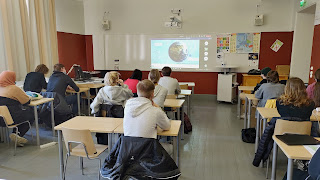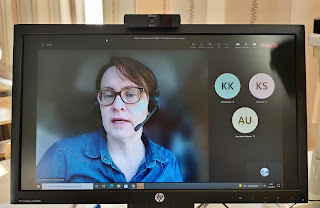UNESCO ASPnet Baltic Sea Project schools celebrated UN World Water Day and Week and did deeds of a global citizen
UNESCO ASPnet Baltic Sea Project schools celebrated UN World Water Day and Week and did the deeds of a global citizen
This week,
the Finnish UNESCO ASPnet Baltic Sea Project schools celebrated the UN World
Water Day and Week (21-25 March 2022). The aim of this international day and
week is to draw attention to the UN's Sustainable Development Agenda2030 target
6, which aims to ensure water and sanitation for all people in the world by
2030. The theme of this year's World Water Day was to make the invisible
groundwater visible. In the UN World Water Week workshops for the UNESCO ASPnet
Baltic Sea Project schools, groundwater and its adequacy were also addressed
during World Water Week from the perspectives of corporate and consumer
responsibility.
In addition
to groundwater, the Water Week workshops addressed the microplastics problem in
the Baltic Sea and biosphere life below and above the surface. The workshops
involved teachers and students from UNESCO ASPnet schools and UNESCO ASPnet
Baltic Sea Project schools from across Finland. The workshops were held in both
Finnish and Swedish, but also bilingually Finnish - Swedish. The UN
World Water Week and Water Day programme for UNESCO ASPnet Baltic Sea Project
schools was developed in the context of Our Baltic Sea project, and
involved schools from across Finland.
The Baltic
Sea microplastics problem
UN World
Water Week started on Monday 21 March 2022 with a workshop on Microplastics in
the Baltic Sea. Anna-Riina Mustonen, a microplastics researcher from the Finnish Environment Institute,
spoke about the microplastics problem in the Baltic Sea, and microplastics
research.
Finally, the workshop came up with some global citizen's actions to prevent the problem of microplastics. The workshop was developed in the context of the national Our Baltic Sea project, and involved schools from all over Finland. Microplastics researcher Anna-Riina Mustonen believes that microplastics can be reduced by using sustainable products, avoiding unnecessary consumption and favouring biodegradable products. She also thinks it is important to put rubbish in the right places and recycle plastic, for example.
Greetings from the Finnish National Agency for Education and UNESCO ASPnet Baltic Sea Project schools’ international meeting in Copenhagen
On the
actual UN World Water Day on Tuesday 22 March 2022, the Water Week programme
continued with a joint opening of the UNESCO ASPnet Baltic Sea Project schools'
programme, where Anu Halvari, Counsellor of Education at the Finnish National Agency
for Education, presented the UNESCO ASPnet Baltic Sea Project schools'
greetings. In her greeting, she described the history of the UNESCO ASPnet
Baltic Sea Project schools network. The network was established on the
initiative of Finland at a time when the Soviet Union was collapsing and
environmental problems in the Baltic Sea were escalating. Today, the UNESCO
ASPnet Baltic Sea Project schools emphasise not only environmental education,
but also global education and the Sustainable Development Goals (SDGs).
Afterwards,
Hanna-Riitta Rissanen, a biology and geography teacher at Tuusula General Upper
Secondary School, and Aino Rekikoski, an upper secondary school student from Tuusula,
brought news and greetings from the international UNESCO ASPnet Baltic Sea
Project schools meeting in Copenhagen. There they had met teachers and students
from the network's schools in other Baltic Sea countries. The Copenhagen visit
also included a visit to a local school in Roskilde.
At the end
of the introductory session, Mika Jokiaho, coordinator of Our Baltic Sea
project, presented the events and activities that have been organised and
planned for the Finnish UNESCO ASPnet Baltic Sea Project schools during the
project. This spring, in addition to the UN World Water Week workshops, Our Baltic Sea project has planned and implemented a study
period, during which project work has been done on the Baltic Sea and its
catchment area from the perspective of different subjects. The texts of the
resulting projects will be included in the textbook Our Baltic Sea, which is
being prepared in cooperation with Opintoverkko Oy. Our Baltic Sea
course will also include an excursion to the Harakka Nature Centre in Helsinki, in April. In
addition, a trip to Seili, an island in the Finnish Archipelago Sea, is planned for May, where a nature camp is being set
up in cooperation with students from the University of Turku. The nature camp
in Seili will end with the Plato Academy's Freedom and Responsibility event.
Water Day culminated in a workshop on Life in the UNESCO Biosphere Reserve of the Archipelago Sea, and a workshop on Groundwater
After a
great start to the Water Day, Erika Silventoinen, Coordinator of the UNESCO
Archipelago Biosphere Reserve, held a workshop on Living in the UNESCO
Archipelago Biosphere Reserve, both in Finnish and Swedish.
The
workshop explored the concept of biosphere reserve and life from both a natural
and cultural perspective. In the workshop, students considered how to move
around in a sustainable way in the UNESCO biosphere reserve of the Archipelago
Sea, and what to do for the well-being of the seas. This same Living in the
Archipelago Sea UNESCO Biosphere Reserve workshop was held on Thursday in a
full Swedish version for primary school students, and on Friday in a Finnish
version for primary school students.
In the
afternoon, Krister Dalhem, Senior Inspector at the South Ostrobothnian Regional
Development Centre, gave a presentation on groundwater and the groundwater
situation in Finland, the Baltic Sea catchment area and the wider world.
Krister Dalhem also looked at the issues affecting groundwater levels and how
groundwater can be protected.
The presentation was followed by a screening of the documentary film "When we run out of water", which showed how humanity is currently overusing the Earth's precious freshwater resources so rapidly that the natural water cycle is being blocked - and there simply won't be enough water for everyone. The day also featured a series of global citizen's actions to ensure that there is enough groundwater for future generations.
Groundwater
and global corporate responsibility and responsible consumption came together
in the Eetti workshop
On
Wednesday 23 March 2022, groundwater was approached from the perspective of
global corporate responsibility and responsible consumption. Minna Laakso, a
global education expert from the Association for Ethical Trade, explained how
the global clothing industry's value and supply chains affect the world's
groundwater situation in Africa, South and South-East Asia and East Asia, and
how we in Finland also contribute to groundwater depletion when we buy these products.
The
presentation highlighted the particular importance of corporate responsibility
and responsible consumption in protecting groundwater resources. During the
workshop, the students came up with global citizen actions to safeguard
groundwater for future generations while contributing to the UN's Agenda 2030
Sustainable Development Goals.
During the UN World Water Day and Week, global citizen's actions were taken to
The UN
World Water Day and Week workshops for UNESCO ASPnet Baltic Sea Project schools
made it easy to bring global and environmental education objectives into the
heart of schools' everyday lives. The workshops could be integrated into the
school's own interdisciplinary study unit (MOK) week or theme day.




Thank you for sharing this with us. stuff for smart people
ReplyDeleteIncredible points. Sound arguments. Keep up the great work. Read about dot net freelancer Chennai from Maria Academy.
ReplyDelete"Thanks for sharing this valuable information.
ReplyDeleteWallpaper in Canada"
I am free from HERPES …❤️❤️❤️❤️❤️❤️❤️
ReplyDeleteEliminate herpes forever.. with herbal product…
certainly the best online i have seen…
Thanks to robinsonbuckler@yahoo. com